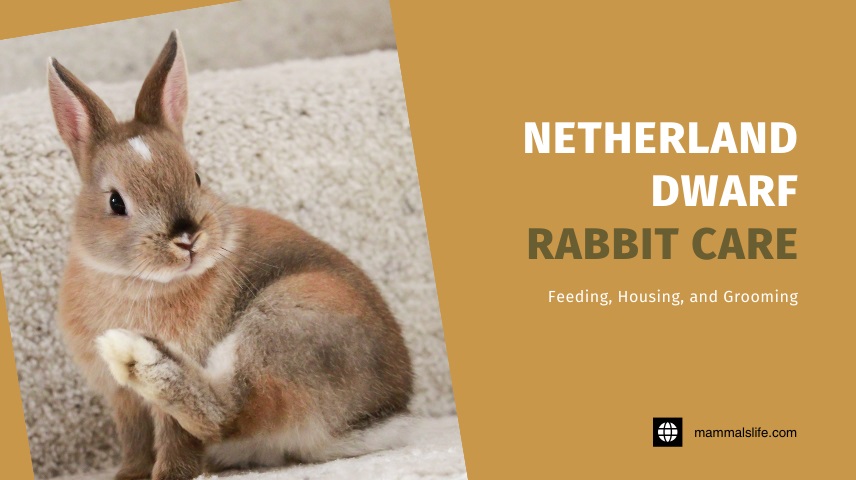Last Updated on February 22, 2025 by Mammals Life
Netherland Dwarf rabbits require a balanced diet, proper housing, and regular veterinary care. They thrive in a loving and safe environment.
Netherland Dwarf rabbits are small, energetic, and social pets. They need a spacious cage with ample room to move and play. Offer them a diet rich in hay, fresh vegetables, and pellets. Fresh water should always be available. Regular grooming is essential to keep their fur clean and free from mats.
Ensure they get daily exercise outside their cage in a secure area. Regular veterinary check-ups help maintain their health and well-being. These rabbits are sensitive and require gentle handling. With proper care, Netherland Dwarf rabbits can be delightful and affectionate companions.
Netherland Dwarf Rabbit Care
Netherland Dwarf Rabbits are tiny, adorable pets that bring joy to any household. Proper care is crucial to keep them healthy and happy. This guide covers essential aspects of Netherland Dwarf Rabbit Care, ensuring your fluffy friend thrives. From feeding to housing and grooming, learn the best practices for your rabbit’s well-being.
Feeding Your Netherland Dwarf Rabbit
Feeding your Netherland Dwarf Rabbit a balanced diet is vital. Their diet should include fresh hay, vegetables, and pellets. Hay is the most important part of their diet. It helps with digestion and keeps their teeth healthy.
Here’s a simple guide:
- Hay: Unlimited fresh hay, such as timothy or oat hay.
- Vegetables: About 1 cup of fresh vegetables per 2 lbs of body weight daily. Examples include leafy greens like romaine lettuce, cilantro, and parsley.
- Pellets: 1/8 cup of high-fiber pellets per 5 lbs of body weight daily.
- Water: Fresh water available at all times in a clean bowl or bottle.
Avoid foods like chocolate, caffeine, and avocado as they are toxic to rabbits. Treats should be given sparingly. Fruits like apples or bananas can be given in small amounts.
Housing For Your Netherland Dwarf Rabbit
Proper housing is key for your rabbit’s comfort and safety. A spacious cage or hutch with a solid bottom is ideal. It should be at least four times the size of your rabbit.
Here are some housing tips:
| Housing Item | Description |
|---|---|
| Cage Size | Minimum 24″x36″ with enough height for the rabbit to stand on its hind legs. |
| Bedding | Soft, absorbent bedding like paper or aspen shavings, cleaned regularly. |
| Litter Box | A small litter box with rabbit-safe litter. |
| Hiding Spot | A small hideaway or tunnel for the rabbit to feel secure. |
Ensure the cage is placed in a quiet, temperature-controlled area away from direct sunlight. Rabbits need time outside their cage for exercise, so make sure to rabbit-proof the area where they roam.
Grooming Your Netherland Dwarf Rabbit
Grooming your Netherland Dwarf Rabbit is important for their health. Regular brushing helps prevent matting and removes loose fur. Use a soft-bristle brush and groom them at least once a week.
Other grooming tips:
- Nail Trimming: Trim their nails every 4-6 weeks. Use a small animal nail clipper.
- Ear Cleaning: Check their ears regularly for dirt and wax. Use a damp cloth to clean gently.
- Teeth Check: Ensure their teeth are not overgrown. Provide chew toys to help wear down their teeth.
- Bathing: Avoid bathing your rabbit as it can stress them. Use a damp cloth to clean dirty spots.
Monitor your rabbit’s health regularly. Look out for signs of illness like changes in appetite or behavior. Regular vet check-ups are essential to keep your rabbit healthy.
Additional Care Tips For Netherland Dwarf Rabbits
Netherland Dwarf Rabbits are charming pets known for their small size and lively personalities. They require special care to ensure they stay healthy and happy. Below are some additional care tips to give your Netherland Dwarf Rabbit the best life possible.
Grooming
Regular grooming helps keep your rabbit’s fur clean and free from mats. Use a soft brush to gently remove loose fur. Weekly grooming sessions prevent furballs and help maintain their coat.
Diet And Nutrition
A balanced diet is essential for your rabbit’s health. Provide a mix of fresh hay, vegetables, and rabbit pellets. Fresh water should always be available. Avoid giving sugary treats or human food.
Exercise
Daily exercise is crucial for your rabbit. Set up a safe space where your rabbit can hop around freely. Interactive toys can stimulate their mind and keep them entertained.
Social Interaction
Social interaction is vital for your rabbit’s well-being. Spend time playing and bonding with your rabbit every day. Rabbits are social animals and enjoy the company of other rabbits and humans.
Health Checks
Regular health checks can catch any issues early. Check their eyes, ears, and teeth weekly. Consult a vet if you notice any changes in behavior or appetite.
Proper Housing
Proper housing ensures your rabbit’s comfort. Provide a spacious cage with a cozy hiding spot. Clean the cage regularly to maintain a hygienic environment.
| Care Aspect | Frequency |
|---|---|
| Grooming | Weekly |
| Health Checks | Weekly |
| Exercise | Daily |
| Social Interaction | Daily |
| Diet and Nutrition | Daily |
| Proper Housing | Regularly |
Frequently Asked Questions
What Do Netherland Dwarf Rabbits Eat?
Netherland Dwarf rabbits eat hay, fresh vegetables, and a small amount of pellets.
How Often Should I Clean Their Cage?
Clean their cage at least once a week to ensure a hygienic environment.
Do Netherland Dwarf Rabbits Need Exercise?
Yes, they need daily exercise to stay healthy and happy.
Are Netherland Dwarf Rabbits Good Pets?
Yes, they are friendly, affectionate, and make excellent pets for families.
How To Groom A Netherland Dwarf Rabbit?
Brush their fur weekly to prevent matting and check their nails regularly.
Conclusion
Caring for a Netherland Dwarf Rabbit requires dedication and knowledge. Provide a balanced diet, a safe habitat, and regular vet check-ups. Socialize with your rabbit to ensure it remains happy and healthy. With proper care, your Netherland Dwarf Rabbit will thrive and bring joy to your home for many years.








